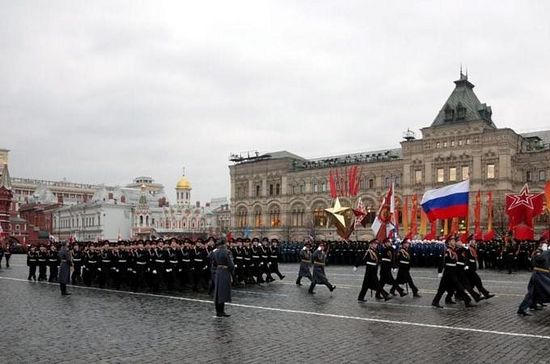
RNA - Following visit of the Israeli Prime Minister Benjamin Netanyahu who touched down in the Russian capital on 9 March to make clear to the Russian leaders the Israel security considerations and concerns over the Syrian conflict developments, the Turkish President Recep Tayyip Erdogan and the German Foreign Minister Sigmar Gabriel arrived in Russia, making Moscow the top destination for negotiations and decisions on a set of important regional issues. Such visits to Moscow are expressive of significant role of Russia in the international and regional developments as well as its position on the global stage which helps settle the disputes on all levels.
The fresh Russian rise is taking place while after Soviet Union’s breakup and until Vladimir Putin’s presidency, Moscow experienced a period of political passiveness. Russia's restoration of leading role is happening after Moscow lost a great deal of its geopolitical influence, global political prestige, and economy and military strength. All these left Russia with the least power to influence the global developments in comparison to the US, Europe, and also the emerging China. Such a loss of clout made Kremlin lose its influence in hotspots like the Eastern Europe, South Asia, and the Latin America, a status in which Moscow became disqualified to be labelled as superpower, or even one of the powers.
But now it has made a comeback, seeking revival of its power for global role playing. To this end, the Russian President Vladimir Putin since his ascension to power chose to take a practical approach in understanding Russia’s domestic potentials and limitations, as well as the foreign requirements of leadership. This approach, in turn, took him to pay a special attention to the global and regional realities and conditions. Moving in the pathway, Russian leader took the country back on the track in a thriving mode of power rise economically, politically, and militarily.
Leveraging geopolitical capabilities
Russia occupies an area of about one seventh of the earth’s dry land, and as part of competition against the countries of the Arctic Circle including the US, Canada, Norway, and Denmark, President Putin has claimed that 20 percent of the Arctic's energy-rich lands belong to Russia. Moscow, moreover, has a permanent seat in the Security Council that has been used to thwart the Western struggles to pressure it through UNSC resolutions in relation to some conflicts such as those of Ukraine and Syria. Furthermore, Russia has huge oil and gas reserves, and stands as a top supplier of the European gas. Even in this case, President Putin takes advantage of the European energy limitations to find an alternative energy provider in a bid to increase Moscow’s bargaining power in its interactions with Europe.
Economic reconstruction
Vladimir Putin made huge investment in a wide range of the Russian economic sectors during his terms in office both as prime minister and president. The top investment hub was the oil and gas sector, a segment of the nation's economy that during the past few years expanded the government’s control over the industry and its incomes. Such an approach put the economy on a new track. The income rise lowered the unemployment rates, and the poverty shrank. In fact, during Putin’s presidency, Russia has witnessed an era of economic boom and enhanced living standards. The economic rejuvenation pushed Russia up as a top nation among others.
But the Western sanctions against Moscow, which struck Russia at the heels of the Crimea Peninsula integration into the Russian territory, along with low oil prices hit hard the Russian export-dependent economy. Nevertheless, Ksenia Yudaeva, the Russian central bank’s first deputy governor, as part of comment on the upcoming March 23 Russia investment summit in London said that the Russian economy has shown promising signs of recovery in the first quarter of 2017, though it takes several years for Russia to see full recovery from the inflation influences.
Military modernization
Russia in past few years invested enormously in defense industries to flex muscles in the face of the US. Russia is experiencing a period of military modernization, most importantly its naval power. The Stockholm International Peace Research Institute (SIPRI) in a 2016 report on the global military expenditure suggested that Russia ranked third globally in its military spending. The report put the Russian military spending share in the GDP at 8.4 percent. Although this amount is said to be eight times less than that of the US, Moscow proved it can keep its military balance with Washington noticeably on the strength of its “strategic nuclear forces.”
While Russia has been struggling to regain its place in world affairs, former US President Barack Obama branded Russia as a regional power in bid to remain Moscow that Washington is superior to it in military, economic, and technology fields. But, Obama's describing Russia as a regional power could be challenged as Moscow holds sway in the East and Central Asia, Eastern Europe and recently even in West Asia, qualifying it to be labeled as a global power.
Russia now has managed to assert its stances on Ukraine crisis. Trump’s coming to power in the US even made Moscow see fewer barriers ahead. Even more, Putin now can see a possible gradual breakup of a united Europe, the outcome of which will draw the European nations closer to Russia. In Syria, Russia, in cooperation with Iran, has managed to to tip the balance in favor of the President Basher al-Assad's government and grow into an influential actor in the West Asia which pushed the US to the sidelines.
According to Alwaght News and analysis website, while American president's policies are dealing a blow to the US global prestige, Moscow is stepping firm toward to regain its superpower status. It now can be tracked in a majority of regional and international developments, and it is almost impossible to find settlement for many disputes without having Russia engaged in solution-seeking processes. This automatically highlights Moscow as a diplomatic negotiation hub to discuss a range of global issues.
847/940